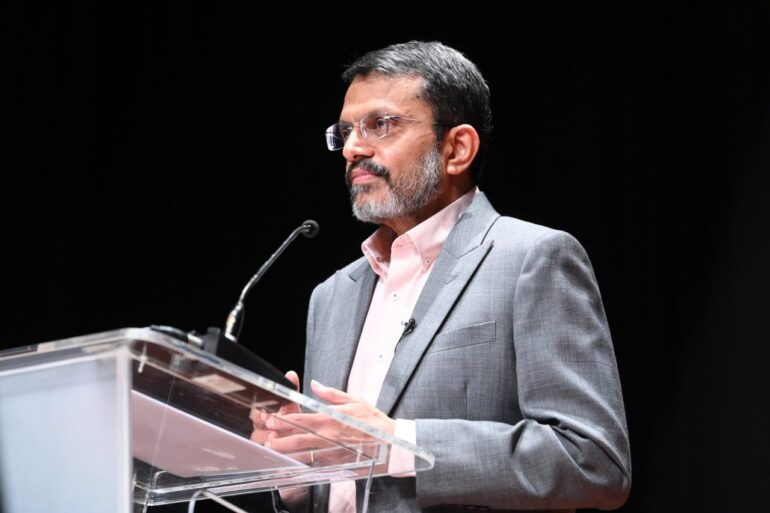TL;DR:
- Singapore’s Monetary Authority (MAS) is actively exploring AI’s role in combating money laundering.
- AI, with its data processing capabilities, helps MAS detect financial irregularities and fraud.
- COSMIC, a digital platform for information sharing among financial institutions, will integrate AI for comprehensive risk assessment.
- MAS emphasizes the need for a multi-layered defense against money laundering, involving various sectors.
- Ravi Menon, the outgoing MAS chief, highlights the importance of balancing AI’s promise with its risks.
- The FinTech Festival will unveil developments in cross-border payments and sustainable data.
- Ravi Menon’s legacy includes job creation and fostering innovation in Singapore’s financial sector.
Main AI News:
In an exclusive interview with the managing director of the Monetary Authority of Singapore (MAS), Ravi Menon, we delve into Singapore’s proactive approach to combat money laundering using artificial intelligence (AI). With the annual Singapore FinTech Festival around the corner, AI is set to take center stage in the battle against financial crimes.
The Power of AI in Detecting Financial Crimes
AI has emerged as a powerful tool for detecting financial irregularities that may elude human scrutiny. MAS has already harnessed the capabilities of machine learning and advanced data analytics to identify fraudulent activities. Its ability to process vast data sets surpasses human capacity, making it an indispensable asset in the fight against money laundering.
Joining the Dots: Strengthening Surveillance
While AI has proved effective in identifying isolated incidents, a recent billion-dollar money laundering scandal in Singapore has underscored the need for a more comprehensive approach. Money launderers often exploit multiple financial institutions, making it imperative to connect the dots across them. MAS envisions applying AI to COSMIC (Collaborative Sharing of Money Laundering/Terrorism Financing Information and Cases), a digital platform set to launch in the second half of 2024. This platform will facilitate information sharing among financial institutions, enabling them to collectively combat suspicious activities. The integration of AI promises to provide additional insights, creating a holistic risk assessment.
Expanding the Defense Network
Recognizing that money laundering extends beyond the financial sector, MAS emphasizes the importance of a “multi-layered defense.” This approach extends to real estate agents and corporate service providers, who must strengthen their mechanisms against illicit fund flows. Additionally, the review of rules governing shell companies with no significant assets is on the horizon, with the establishment of an inter-ministerial committee.
Balancing Promise and Peril
As AI’s adoption surges in the financial sector, MAS acknowledges the need for a balanced approach. Ravi Menon cautions that while AI brings promise, it also brings risks that must not be ignored. Striking the right balance between harnessing AI’s benefits and mitigating its risks is paramount.
Advancements in Cross-Border Payments and Sustainability
The upcoming FinTech Festival promises exciting developments, including enhanced cross-border payments through the linkage of Singapore’s PayNow system with Malaysia’s DuitNow. Project Greenprint, focused on sustainable data, continues to evolve as the MAS seeks to address challenges in obtaining trusted sustainability data. Furthermore, efforts are underway to facilitate instant settlement for cross-border transactions using central bank digital currencies.
A Remarkable Legacy and Future Contributions
As Ravi Menon prepares to retire, he reflects on his tenure as the longest-serving managing director of MAS. His dedication to upskilling the local financial workforce and fostering innovation within the industry has yielded impressive results. Despite initial concerns about job losses due to digitalization, Singapore exceeded its targets for job creation in the financial sector. Mr. Menon looks forward to contributing to technology and innovation, social inclusion, climate change and sustainability in his retirement, emphasizing that there are numerous avenues for making a meaningful impact beyond politics.
Conclusion:
Singapore’s strategic adoption of AI in anti-money laundering efforts, coupled with its commitment to innovation and sustainability, positions it as a leader in the global financial market. The integration of AI in financial surveillance and collaboration across sectors strengthens Singapore’s resilience against financial crimes, making it an attractive hub for businesses seeking a secure and innovative financial ecosystem.

